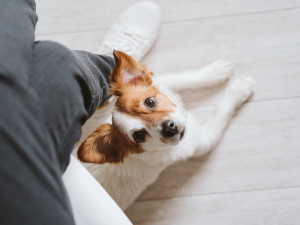How Do Dogs Know That You Are Coming Home?
Your dog’s keen sense of smell isn’t the only clue.

share article

Your pet wants you to read our newsletter. (Then give them a treat.)
One of the best things about living with dogs is the unbridled joy with which they greet you when you come home — no matter how long you’ve been away. It has long been thought, and oftentimes documented, that dogs have a sixth sense that allows them to “know” your ETA in advance. Just how do they do it?
In Alexandra Horowitz’s book, Being a Dog, she offers what seems to be a very reasonable explanation. It isn’t just that they can smell us from afar or hear our footsteps or the car motor. Rather, as she writes, “there was a potent combination of two forces leading to these dogs’ abilities. The first is the distinctness of our smell to our dogs. The second is the ease with which dogs learn our habits.”
Dogs can basically smell time.
She says, “It might be that the odors that we leave around the house when we leave lessen in a consistent amount each day.” Basically, your smarty dog’s amazing nose knows that over the hours you are gone, your home begins to smell lessopens in a new tab of you.
Horowitz tested this theory by recruiting a colleague to sneak one of her partner’s stinky t-shirts into the house hours after her partner left, once again infusing the house with his odor. And yes, the ruse seemed to work. That day, their dog, who had reliably demonstrated that he knew when his person was nearing home, was found snoring on the couch.
Dogs know based on their experiences.
Dogs are also remarkably quick at associative learning. They’re very good at picking up on subtle cues like reading body language, changes in the environment, and listening to sounds. And not just your own signals, but maybe the sound of a neighbor’s car that starts up a few minutes before you arrive home. Environmental stimuli like light shiftsopens in a new tab, sounds, smells, and even cues you can’t pick up on can play a role in your dog’s ability to sense when you’re coming home.

Claudia Kawczynska
Claudia Kawczynska was co-founder and editor-in-chief of The Bark for 20 years. She also edited the best-selling anthology Dog Is My Co-Pilot.
Related articles
![Dog chewing spiked orange toy at home]() opens in a new tab
opens in a new tab6 Ways to Keep Your Dog Entertained While You’re At Work
Don’t hit pause on your pet’s playtime – these solo activities will help 9-5 fly by for them.
![Person in a white dress with a calm tan dog leaning on their lap]() opens in a new tab
opens in a new tabHow Dog-Appeasing Pheromones Can Help Dogs Relax
Hey, man. It’s all about those chemical messengers. See how Adaptil can help your pup.
![A woman wearing a knit sweater holding a dog close on the floor of her bedroom.]() opens in a new tab
opens in a new tabSeparation Anxiety in Dogs
Train your dog to stay calm when they’re on their own — instead of sad-singing “All By Myself” until you come home.
- opens in a new tab
Why Does My Dog Follow Me Everywhere?
They are the cutest little shadow.




